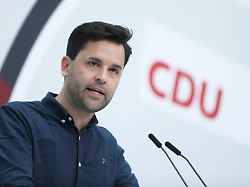Energy talk with Markus Lanz
JU boss: “Wouldn’t do the heating law at all”
By Marko Schlichting
9/7/2023 4:03 am
listen to the article
This audio version was artificially generated. More Info | send feedback
The industrial electricity price splits the traffic light coalition. Meanwhile, the Union is debating plans to raise taxes for high earners. On ZDF with Markus Lanz, the guests argued about both topics. JU boss Winkel makes a very idiosyncratic savings proposal.
The dispute over discounted electricity for large industrial companies is splitting the traffic light coalition. Greens and SPD are in favor, Chancellor Scholz is skeptical, the FDP against. Even the Union parties cannot get used to it. In the ZDF talk show Markus Lanz, the new idea is one of the topics of discussion in the evening.
SPD General Secretary Kevin Kühnert is one of the supporters of the industrial electricity price. Germany’s strength is industrial production, and that will remain so in the coming years, even after the switch to renewable energy, says the politician at Markus Lanz. The traffic light coalition is currently discussing how Germany can remain competitive in the coming years. “We are totally at the side of the Chancellor when he says it can’t be done with the watering can and not without conditions,” explains Kühnert. “We don’t want to throw money at companies that don’t do anything for the transformation. We just have to define the right tools for it.” The SPD had presented a concept in which they would propose more than just reducing electricity prices for a few years, and Chancellor Scholz did not speak out against it either. The goal is that companies that support the transformation in the energy sector should have the opportunity to be spared fluctuating electricity prices in order to be able to calculate better.
JU boss against “subsidy cycle”
The chairman of the Junge Union, Johannes Winkel, is against the reduced industrial electricity price. He speaks of a subsidy cycle: “First we switch off all base load energies in Germany, coal and nuclear power. Then we are surprised at the high energy prices and the fact that the industry is migrating. And now we say, now we have to cross-subsidize with taxes so that the companies don’t leave.” Winkel’s solution: Get out of the subsidy cycle. “During the energy crisis, we had no need to cut back on supply for ideological reasons.”
Winkel thinks the exit from nuclear energy is wrong. Even if the three nuclear power plants connected to the grid at the end only covered about five percent of the electricity consumption, that meant an incredible amount of energy for an industrial company. Winkel calls for a return to nuclear energy. Kühnert sees it completely differently. The increase in electricity prices over the past year is related to geopolitical challenges, especially the war in Ukraine. “The offer is sufficient,” he says.
Controversy over tax increases
Meanwhile, the Union is arguing about a proposal by CDU leader Friedrich Merz, who proposes a change in the top tax rate. The plans have been there for a long time. The Union wants the top tax rate of 42 percent not to apply from an annual income of 63,000 euros, but only from around 100,000 euros. Anyone who earns more than 1.1 million euros a year should pay 48 percent in taxes. Winkel disagrees. “We don’t need a debate about tax increases,” he says at Lanz. Germany must become attractive to foreign top executives and keep top German executives in the country.
“Merz is on the way to the right concept,” replies Kühnert, who can gain a lot from the Union’s plans. “For some time now, we’ve been of the opinion that an income tax reform should be introduced that reduces the burden on the bottom but brings in moderately more for higher incomes.” Important for Kühnert is an income-neutral reform, which is only about redistribution.
“The traffic light believes in a German climate”
Winkel, on the other hand, wants to save money. “For example in energy policy,” he says. “Let’s take the heating law, how much state funding goes into funding. You can save a lot by simply not doing it.” The building energy law was passed by the black-red coalition. There had been a month-long dispute in the traffic light coalition about the reform of the law. It is to be decided in the Bundestag on Friday.
Winkel criticizes: “The heating law is pointless in terms of climate policy.” According to the CDU politician, China uses up the amount of CO2 that will be saved by 2030 within one day. The traffic light coalition apparently believes there would be a German climate. But climate change is a global problem. In terms of climate policy, the heating law is useless: “I wouldn’t make the law at all.” A demand for which Winkel may even find little approval from his own party.
